
As a marketer in the multifamily apartment industry, spotting renters in their “journey” through the funnel is always exciting. Contact form conversions are shown in Google Analytics. Voicemails from prospects that called a tracking number can be played in a CRM. These are tangible. We can clearly see the marketing source working, at least the one in which they decided to connect with.
But these days, you could see a 15% decrease in Users visiting your website week-over-week, but actually get a boost in Users consuming data from your website from other means.
As Google continues to provide search result enhancements via featured snippets, knowledge panels, local packs (map results), the “zero click” phenomenon continues to rise. This is simply obtaining the sought out information directly in Google search, without clicking over to a website. Nearly 60% of Google searches now end without a click in 2024.
Never heard of “zero click”? You’re likely already doing it. Type in “The Bear reviews” and scroll through over 1,400 audience reviews of the Hulu show without leaving Google search. Type in “Phillies” and get the live score of the game. Type in an apartment community name and read reviews, view photos and floor plans, get ratings from other sources—all without leaving Google search.
With Google’s SGE (Search Generative Experience) now added to the mix, AI is packed into the search results, combining immediate research from multiple resources into one large answer. But how a search is phrased seems to be needed to trigger SGE.
Side Note: I’ve noticed that since SGE went from a Google Labs opt-in experience to public, the results for branded search have both positive and negative reviews removed from the mix. Previously, sentiments from customers were used to help define a company.
With voice search on the rise via smartphones, digital assistants, wearable devices and smart speakers, website visits will likely decrease. In 2024, 45% of Americans report using voice search on their smartphones.
And now with multiple AI solutions available for research, indirect conversions from website data will likely increase and get more difficult to prove. OpenAI ChatGPT, Google Gemini, Bing Copilot, Claude and Perplexity don’t provide search query data, so today’s marketer can’t obtain any valuable info on what prospects are querying.
Are potential renters using AI tools to find their new homes? I’m not certain, but here’s how many active users some of big players have:
- ChatGPT: 200 million (May 2024)
- Google Gemini: 142 million (early 2024)
- Bing Copilot: 140 million (April 2024)
- Perplexity.ai: 10 million (July 2024)
Let’s test out some potential experiences.
ChatGPT
For ChatGPT, with GPT-4o, I provided the following query:
Can you provide a list of the three best apartment communities in Austin, Texas that have a 1 bedroom starting at no more than $1,600. Other requirements needed are a dog friendly community that includes on-site parking and an outdoor swimming pool. Finally, can you include only those with rent specials with big savings?
I also tried it for Nashville, TN, Raleigh, NC and Columbus, OH, changing only the city name and market rate for a 1 bedroom. For each result, RentCafe was provided as the source. Example:
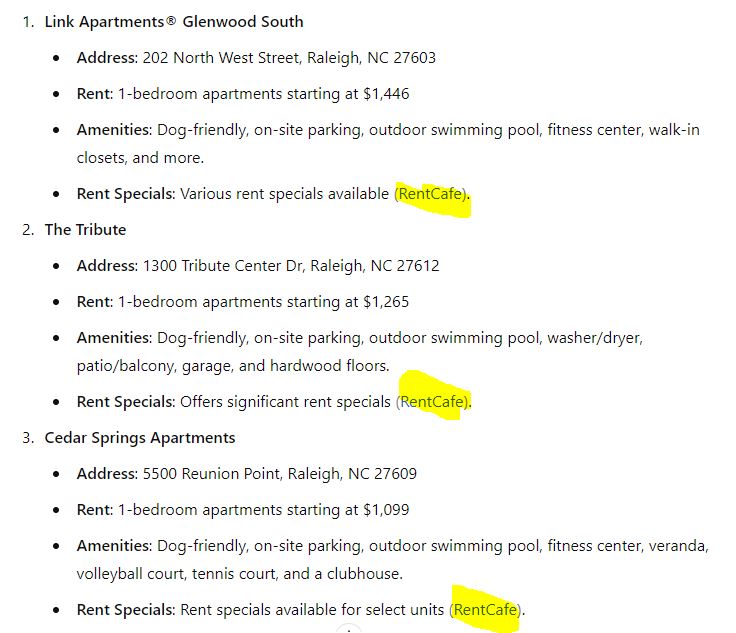
I then asked why RentCafe is only being used as a source of data. Response:

I then tried the same query for Manayunk, Philadelphia and sources then switched to Redfin.
In querying later in the day, the results were completely different, but the source remained the same for all “top three” answers. This creates a bit of distrust and realized source favoritism. Speaking of being partial, the query results for the Austin search listed only communities from Northland.
Utilizing the voice chat feature in the ChatGPT iOS app, the results were a let down. After reiterating what my absolutes were for a potential apartment in Phoenix, AZ, and then answering follow-up leasing questions, I had to wait through over three minutes of silence to finally be provided with advice on how to search elsewhere. Check out the conversation here:
Bing Copilot
Using the same query that I used for ChatGPT above, the Bing Copilot results included distracting ads for ApartmentList.com. See below in yellow. The ads didn’t link to the city specific section of ApartmentList.com either, which is some wasted ad dollars.
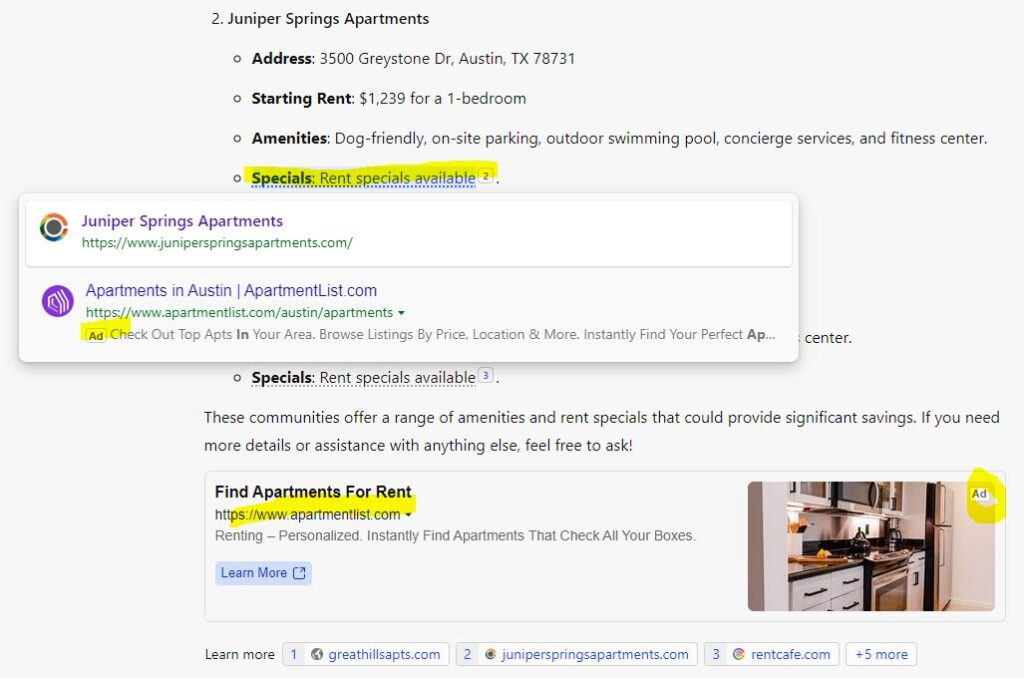
When I whittled down a Raleigh, NC search, I asked if it could provide the pros and cons of Google reviews for The Tribute and Cedar Springs Apartments. It then gave an analysis and chose The Tribute as the clear winner:

It also provided a screenshot of reviews from Facebook and Yelp, putting Cedar Springs in a bad light. It decided to show the 2.4 Yelp rating even though Cedar Springs had much higher ratings on other sources, including 3.5 on ApartmentRatings.com and 3.8 on Apartments.com:
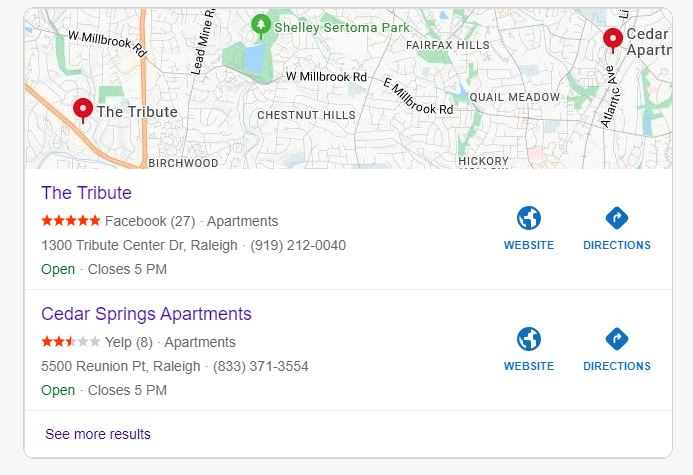
When asking to provide a sentiment analysis and the pros and cons of living at each community, Copilot provided individual URLs to each category statement, shown in yellow below. When hovering over the quantity of sources, the links would appear. Copilot seems the most transparent for data attribution.
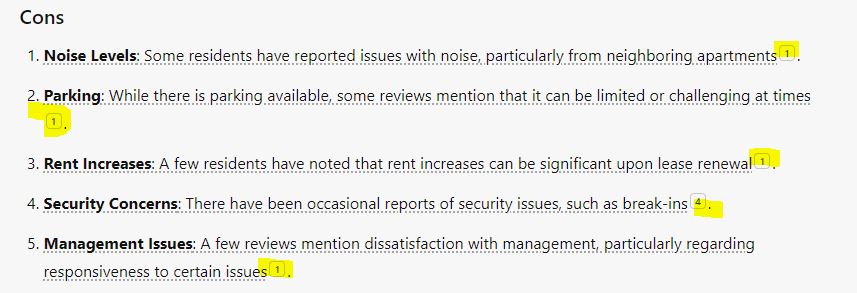
Google Gemini
With Google Gemini, I asked for a pros and cons comparison for two Nashville, TN communities (The Lucile and Livano Trinity). I indicated that community events and a social atmosphere were super important to me.
For The Lucile, one of the cons was “potential for exclusivity”, hinting that luxury living could impede on the social lax vibe that I was seeking.

Interestingly, Gemini indicated that Livano Trinity’s large 300+ unit size could lead to a “less close-knit resident group”:

Both of these examples above reveal how Gemini highly values whatever is designated as vital in the query.
In requesting a sentiment analysis of Google Business reviews for both communities, Gemini was unable to do so. It stated: Google’s API restrictions prevent me from directly scraping and processing review data in this way.
Amazingly, you figure that this would be the one AI experience where Google reviews could be sifted through a colander and pinpoint spicy trends. But, nope.
Gemini also doesn’t reveal sources. It simply recommended visiting review sites, ILS sites and the community website. See below:

Perplexity.ai
In utilizing the same query that I originally used for ChatGPT, Perplexity.ai provided three options and detailed the 12 sources for the results. Below are four of the ILS sources which have direct links to pre-filtered selected pages.
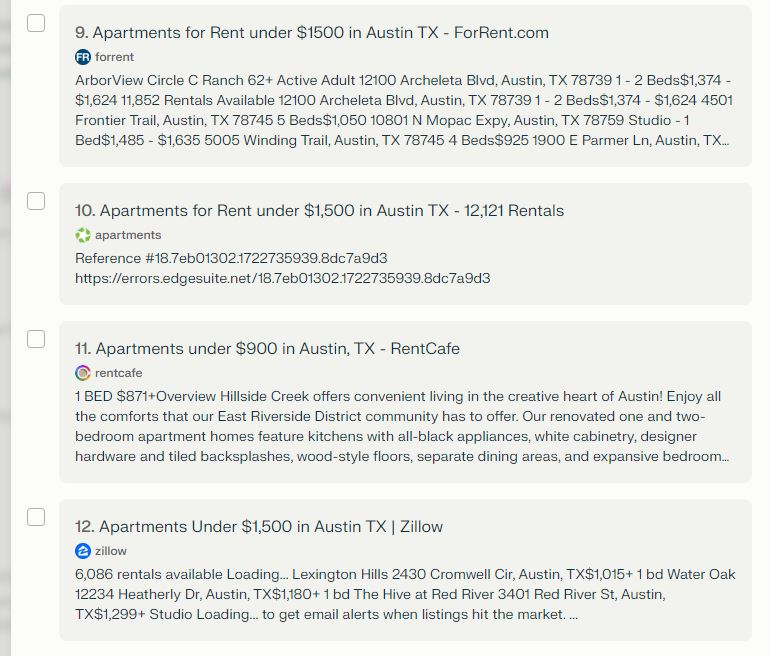
I then asked if it could search all review sites possible to determine sentiment and develop a pros and cons list. It was able to compile info from Yelp, ApartmentRatings.com, Zillow and the property website which utilized Birdeye. Google Business reviews could not be tapped into.
ChatGPT … Another Test
So, I got more Philly centric and queried about some Manayunk area apartments. With one of my absolutes being an outdoor swimming pool, it provided the below three top selections. But only one of these communities, Henry On The Park, actually has a pool.
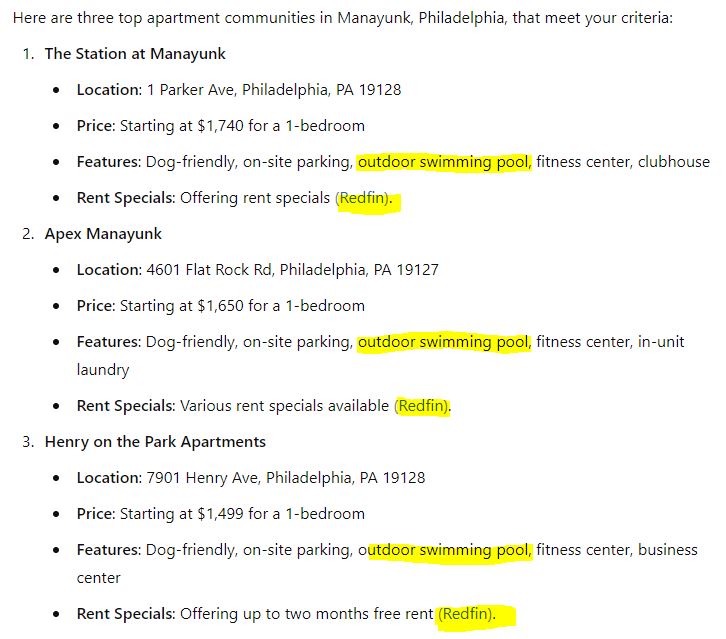
And when requesting some Old City, Philly apartments, it provided the website link to The View At Old City for ALL results. This is a disservice to the competitors and an obvious web traffic boost for The View At Old City.
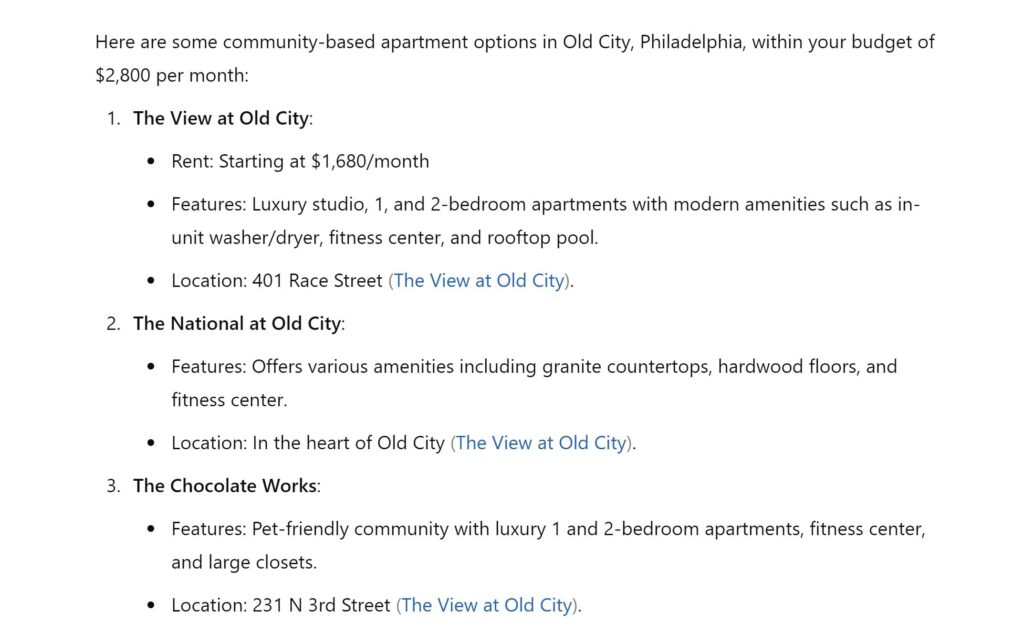
Claude
Even with the Claude.ai 3.5 Sonnet Pro version, the apartment search ends relatively early with this:
I don’t have access to real-time rental information or current availability. The rental market changes frequently, and prices and specials can vary. Additionally, what constitutes “the best” can be subjective.
Instead, I can provide you with a general approach to find apartments that match your requirements: Use apartment search websites like Apartments.com, Zillow, or Rent.com.
Conclusion?
Although AI is effectively built into leasing widgets and chatbots, utilizing FAQs and tabled data for info, and although it’s fantastic for content creation, using these platforms as a prospect has a lot of pitfalls and inaccuracies.
For the tests above, I didn’t spend much time on the queries and the results are wildly varied. Spotting obvious errors and looming through UX oddities is perplexing. At its current state, I imagine many prospects would bounce from the experience and lean toward organic searches, ILS sites and social media.
Of course, these issues will probably disappear in a week based on the rapid progression of AI tools. 🤯 … More to come on that!
Have you tested the waters with these tools yet with your prospect hat on yet? What was your experience like?